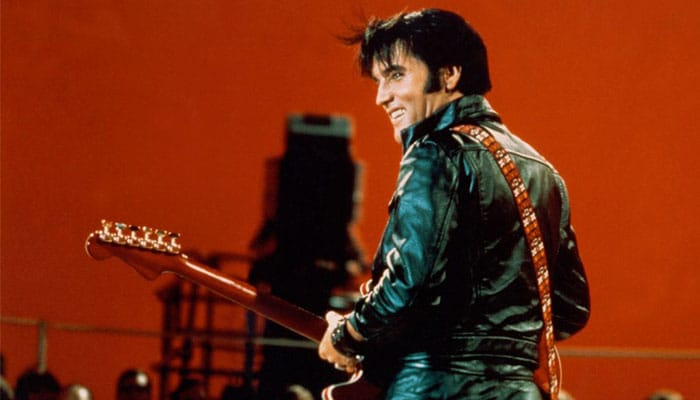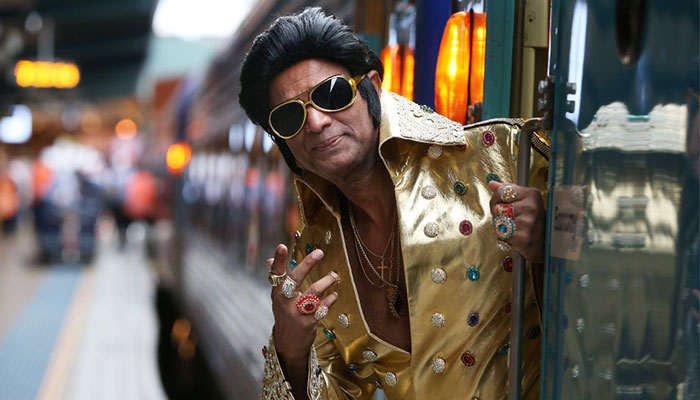Necro-brands: Why do celebrities like Elvis Presley make more money dead than alive?
New research led by Macquarie University's Professor Chris Baumann explains why the king of rock and roll’s brand is worth more than ever.

First published by Macquarie University
From regional New South Wales to London, Elvis Presley continues to be a bankable star almost 50 years after his death. New research led by Macquarie University's Professor Chris Baumann explains why the king of rock and roll’s brand is worth more than ever.
The regional NSW town of Parkes is a long way from Graceland, the former home of Elvis Presley in Memphis, Tennessee. Yet the king of rock and roll continues to be celebrated more than four decades after his death in 1977, including at the Parkes Elvis Festival.

This week the town will host scores of Elvis tribute acts, look-a-like contests, Elvis poetry readings, rock and roll dancing, buskers and a Miss Priscilla competition. The Elvis Express will transport train passengers travelling to the festival from Sydney on January 9 in carriages such as the Graceland Express, All Shook Up Shuttle, Burning Love Bullet and Viva Las Vegas Line.
Endorsed by Presley’s estate, Elvis Presley Enterprises Inc. (EPE), the festival is one of the state’s major tourist events and a lucrative money spinner for the regional town.
Among the thousands of fans will be Professor Chris Baumann from the Department of Marketing at Macquarie University, who will attend the festival for the third time.
“There’s such a magic to this and I think it’s a reflection of Elvis mania,” he says. “The fans really just love these events that also include international impersonators.”
The classic necro-brand
Michael Jackson, Prince, David Bowie, John Lennon and Kurt Cobain are among other long-dead celebrities whose image continues to be sold to the public.
But Professor Baumann says the king of rock and roll is the most successful example of a concept he has dubbed necro-branding.
Necro-branding is where the image of a celebrity is sold to the public by direct stakeholders such as the family or estate or indirect stakeholders such as fans, long after the celebrity has died.
Professor Baumann says necro-branding is fuelled by parasocial grief or the sense of loss felt by fans over the death of a celebrity.
“There are a lot of dead celebrities, but Elvis is unique,” he says. “Look at the number of impersonators. There are Gracelands all over the world as well as festivals and thousands of items of merchandise.”
In his paper Necro-branding: Elvis Presley as a necro-celebrity, published in the journal Celebrity Studies, Professor Baumann and his co-authors explain the post-mortem consumer appeal of Elvis to fans young and old. They also explain how necro-branding is a multi-billion dollar industry that will be further fuelled by technology such as Artificial Intelligence (AI).
From improving the sound and picture quality of old clips to the AI-generated Elvis avatar in London, technology is enabling and fuelling advances in necro-branding.
Elvis was worth about US$5 million dollars at the time of his death in 1977. In 2022, Elvis Presley Enterprises had an estimated net worth of between $400 million and $500 million thanks to Elvis-themed postage stamps, Baz Luhrmann’s 2022 Oscar-nominated biopic and Elvis tribute acts.
Professor Baumann says the scale and type of interaction consumers have with Elvis can be measured by listener data on music streaming services and analysing user comments on social media platforms such as YouTube.
Elvis continues to be far more popular than other solo male singers of his era such as Chuck Berry, Roy Orbison or Dean Martin, Spotify data reveals.
Professor Baumann says user comments on social media - such as likening Elvis to a God-like figure or the use of his music at weddings and funerals - revealed the religious and ceremonial aspects of Presley’s necro-brand.
Elvis’s musical talent, his position in American culture and the triggering of emotions are some of the other elements contributing to the post-mortem success of his brand.

“An understanding of people’s connections to Elvis is essential to the formulation and execution of effective marketing strategy and fan community engagement,” Professor Baumann says.
The necro-branding theory can also be applied to other deceased singers, actors and royalty.
Professor Baumann says technology has the potential to expand the marketability of necro-celebrities such as Elvis by expanding the range of potential products and entertainment.
Fans can fork out up to £300 (A$594) to see Elvis Evolution in London in 2025, which uses AI to animate thousands of Elvis’ personal photos and hours of the star’s home-videos in an immersive theatrical experience. And Professor Baumann will be there for this historic event.
“From improving the sound and picture quality of old clips to the AI-generated Elvis avatar in London, technology is enabling and fuelling advances in necro-branding,” he says.
Chris Baumann is a professor in the Department of Marketing at Macquarie University.




